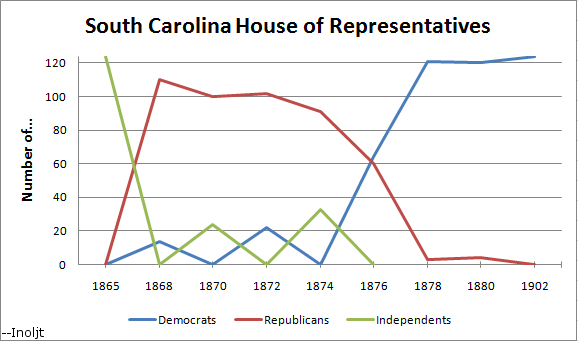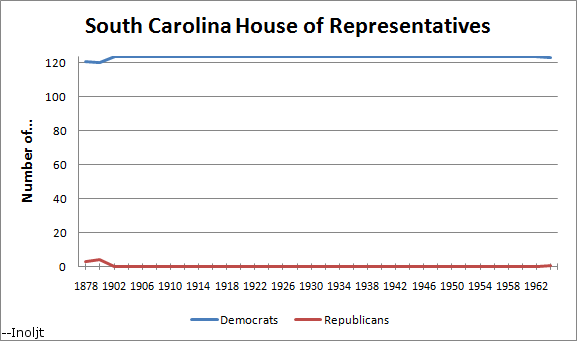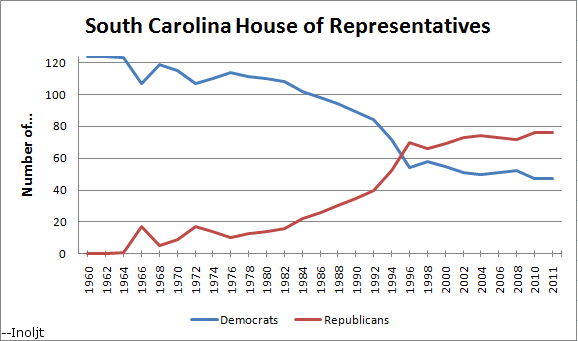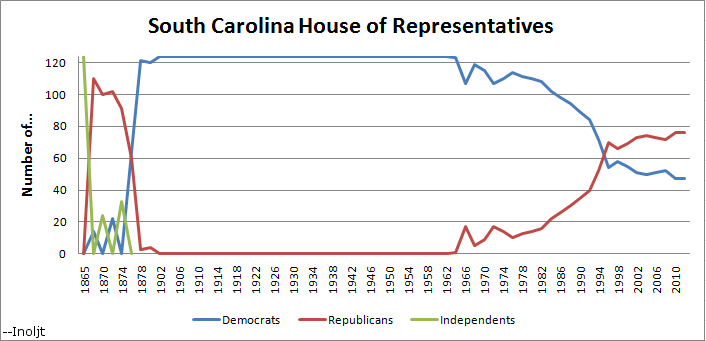In my research on South Carolina’s 2010 gubernatorial election, I came upon a fascinating chart. The chart describes the number of Democrats and Republican in South Carolina’s State House of Representatives from the Civil War to the present day. The data offers a fascinating story of the Democratic Party in South Carolina, and the Deep South in general.
Here is the story:
Most individuals familiar with politics know the history of the Deep South: it seceded from the Union after President Abraham Lincoln was elected. In the resulting Civil War, it fought the hardest and suffered the most against Union forces.
Victorious Union forces were identified with the hated Republican Party, founded with the explicit goal of destroying the southern way of life by ending slavery.
Under military Union rule, the Republican Party flourished in South Carolina:
The Republican Party was the dominant political force during the Reconstruction era, as the graph above shows. During its reign in power, it enjoyed large majorities in the State House of Representatives. Its political base was the black vote, and it attempted to systemically ensure racial equality for blacks and whites. A number of blacks were elected to state and federal office; it’s probable that many of the Republicans in the State House of Representatives were black.
This enraged whites in South Carolina. When President Rutherford Hayes ended Reconstruction and withdrew federal troops, they quickly gained control of South Carolina politics. The black vote was systemically crushed, and along with it the Republican Party.
This is reflected in the graph above. In 1874 there were 91 Republicans in the State House of Representatives. By 1878 there were only three left.
This led to the next stage of South Carolina politics, the Solid South:
Unfortunately, Wikipedia does not have data after 1880 and before 1902. After 1902, however, Democrats enjoyed literally absolute control of the State House of Representatives. For more than half-a-century, not a single Republican in South Carolina was elected to the State House of Representatives. Democrats regularly won over 95% of the popular vote in presidential elections.
That’s a record on par with that of the Communist Party in the Soviet Union.
There are several reasons why this occurred. Democrats in South Carolina were strongest of all the Deep South states, because blacks were the majority of the population. Only Mississippi at the time also had a black-majority population.
This meant that in free and fair elections, blacks would actually have control of South Carolina politics. If a free and fair election took place in another Southern states, the Democratic Party would still probably have maintained power – since whites were a majority of the population. In fact, this is what happens in the South today, except that the roles of the two parties are switched.
This was not the case with South Carolina, and party elites were profoundly aware and afraid of this. Therefore the grip of the Democratic Party was tightest in South Carolina, of all the Solid South (South Carolina was the first state to secede from the Union for the same reason). Other Solid South states had more than zero Republicans in the state legislature. Republican presidential candidates might gain 20-40% of the vote, rather than less than 5%.
In black-majority South Carolina, the Republican Party was a far greater potential threat – and so the Democratic Party was extraordinarily judicious in repressing it.
Racism was a useful tool for South Carolina Democrats, and they were very proud racists. Controversial South Carolina Governor and Senator Benjamin Tillman, for instance, once stated that:
I have three daughters, but, so help me God, I had rather find either one of them killed by a tiger or a bear and gather up her bones and bury them, conscious that she had died in the purity of her maidenhood by a black fiend. The wild beast would only obey the instinct of nature, and we would hunt him down and kill him just as soon as possible.
Another time he commented:
Great God, that this proud government, the richest, most powerful on the globe, should have been brought to so low a pass that a London Jew should have been appointed its receiver to have charge of the treasury.
This was the Democratic Party of South Carolina during the Solid South.
At the end of the graph, notice that there is a little dip, just after the year 1962. This was in 1964, when the first Republican in more than half-a-century was elected to the South Carolina State House of Representatives.
The year 1964 marked the day that Democratic President Lyndon B. Johnson pushed through the 1964 Civil Rights Act, against enormous Southern Democratic opposition.
It also marked the beginning of the end of the South Carolina Democratic Party. The Democratic Party underwent a monumental shift, from a party of white elites to a party representing black interests. In the process South Carolina whites steadily began abandoning it.
At first the decline was gradual, as the graph shows. In 1980 there were 110 Democrats in the State House of Representatives and 14 Republicans. Throughout the 80s the Democratic majority steadily declined, but in 1992 there were still 84 Democrats to 40 Republicans.
Then came 1994 and the Gingrich Revolution. The seemingly large Democratic majority collapsed like the house-of-cards it was, as South Carolina whites finally started voting for Republican statewide candidates, decades after they started doing so for Republican presidential candidates. Republicans have retained control of the state chamber ever since.
Since then the Democratic Party has declined further in the State House of Representatives. As of 2010 the number of Democratic representatives is at a 134-year low. And the floor may not have been reached. There are still probably some conservative whites who vote Democratic statewide, when their political philosophy has far more in common with the Republican Party.
Nevertheless, the modern era in South Carolina politics is still shorter than the Solid South era. Here is the entire history of the State House of Representatives:
It’s a fascinating graph, and it tells a lot about South Carolina and Deep South politics.
–Inoljt, http://mypolitikal.com/













